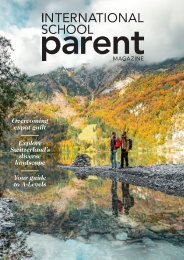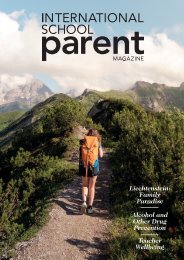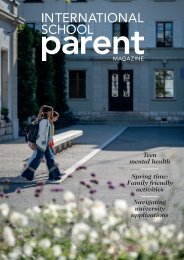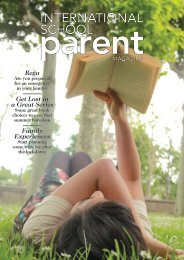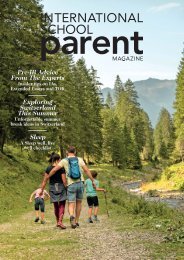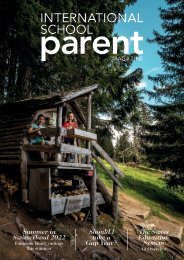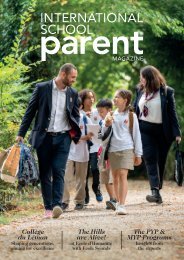International School Parent Magazine - Autumn 2019
- No tags were found...
You also want an ePaper? Increase the reach of your titles
YUMPU automatically turns print PDFs into web optimized ePapers that Google loves.
Assessments in each of their courses and the Extended Essay.
Joseph Amato, IB DP Coordinator at Zurich International
School (ZIS) recommends students to create a schedule: looking at
the time they have available, deciding which subjects require the
most amount of time, deciding how they’re going to best prepare
for those subjects and then sticking to that schedule. “I tell them not
to necessarily spend a whole day just studying Maths at the expense
of everything else. Maybe the emphasis that day is Maths, but try
and get the other subjects in as well. Then, of course for different
students, maybe another system works better. It does depend on the
student and needs a personal approach.”
Get your hands on curriculum outlines, marking schemes and
past papers
To truly get ready for revision from the first term, Keith Sykes of
Collège Champittet recommends students ensure they get a copy
of the written curriculum for each of their subjects. This will help
them track their progress, annotating where they’re confident and
where they need help. “Schools will also use DP planners, and
students can ask the school or the teachers: When are they are
going to put the breaks in? Are they doing it by chapter in a book?
Are they doing it by topic? When are they doing an experiment?
Find out what those weigh points are and use them to structure
your mind mapping and summarizing throughout the course”.
Other documents he recommends getting hold of early on are past
papers and marking schemes. “They are all so readily available. It
seems to me to be an insanity to not looking at the questions you
might get asked!”
Regularly make notes
Note-making is a recurring theme among DP Coordinators. Dr.
Zoe Badcock, AP/IB Coordinator at the International School
of Zug and Luzern (ISZL) advises students make the effort to
summarise their learning as they go, for example, to make revision
notes at the end of every unit in preparation for a unit test. “I
often see them doing that all at the end of two years, and if they’ve
just spent time doing that after each unit, it wouldn’t be such an
onerous thing”. She’s observed that when students do this they
aren’t as worried about poor grades in the final exams because they
have a real sense of their learning progressing. If, in the process of
making notes, they notice they haven’t understood something, they
know it’s something to allocate time towards revisiting.
Joseph Amato (ISZ) equally emphasises the importance of
regular revision. “Even though we have a very short, tight school
year to get everything done, I try and build revision into our day to
day experiences, maybe every few days take a half a class to go over
topics, to practice an essay from something we did from the year
before.”
Keith Sykes (Champittet) admits that mind mapping and
summarising is a key skill, that in itself takes practice. He often gets
students to use the Cornell note taking method, which requires
them at regular intervals, in the evening or at the end of the week,
to summarise their learning, a good way of committing things to
medium- and long-term memory. He says that “Another thing that
students don’t generally do, but they should, is to review a couple
of weeks or a month and look at how the work they’ve done in
one subject relates to work they’ve done in other subjects.” This
transfer of knowledge and making links is core to the IB, and
something students work on in Theory of Knowledge, which helps
to understand, internalise and store knowledge longer.
Make a plan for using free periods productively
Free periods are certainly there to give students a bit of breathing
space and independence. But their purpose is to create time for
the individual to focus on what the individual needs to work on –
outside of a class setting. It is certainly an exercise in self-discipline
and self-management but one that will pay off enormously in
the future. Making time to plan the day or week ahead, reflect
on what’s most urgent and what can be rescheduled – these are
common indicators of happy and effective people in the workplace.
So, now’s the time to start practising! Kate Bradley, Head of
Secondary at La Côte International School advises students to use
their free periods to “ensure they’re doing something related with
their studies and making sure there’s no gaps in what they’ve just
learned. It could also be using that time to structure their notes in
folders, dividers. Organisation and persistency are key to IB DP
success”.
Mentor your child
Clearly, as parents, we all reach a point where we can no longer
help our children with the content of a particular subject. But
taking an active interest and asking the right questions can aid
students in identifying what knowledge they master, and what
they’re still unclear on. Dr. Eugene Stevelberg (Florimont)
INTERNATIONAL SCHOOL PARENT AUTUMN 2019 | 33






